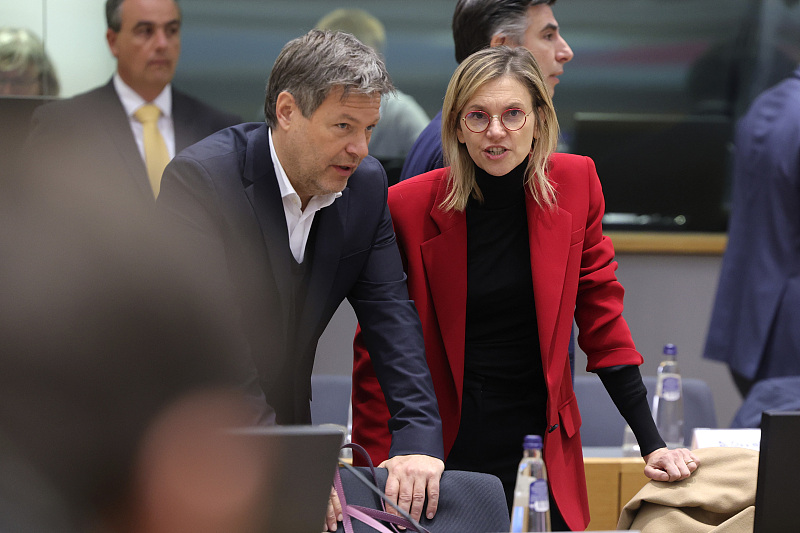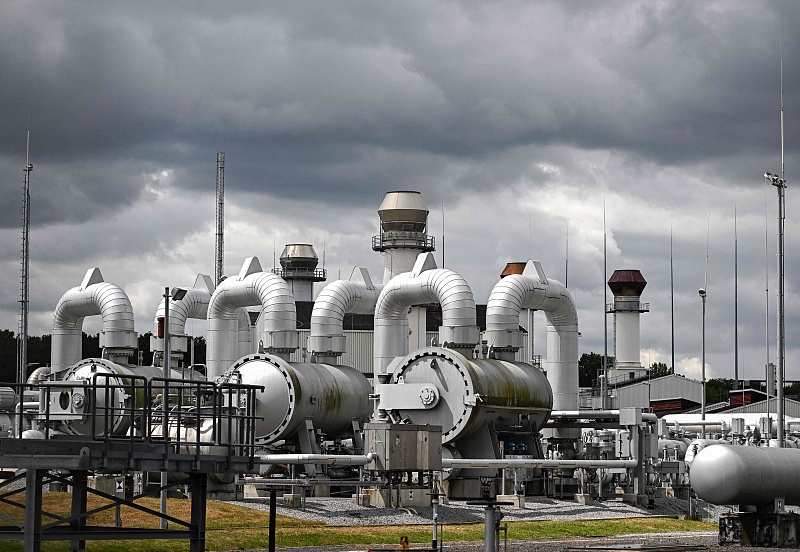
French Minister for Energy Agnes Pannier-Runacher (R), speaks with Germany's Climate Action Minister Robert Habeck during a meeting of EU energy ministers in Brussels, Belgium, December 19, 2022. /CFP
French Minister for Energy Agnes Pannier-Runacher (R), speaks with Germany's Climate Action Minister Robert Habeck during a meeting of EU energy ministers in Brussels, Belgium, December 19, 2022. /CFP
European Union energy ministers on Monday agreed a gas price cap, after weeks of talks on the emergency measure that has split opinion across the bloc as it seeks to tame the energy crisis.
The price ceiling, which can be triggered starting from February 15, 2023, was fixed at 180 euros per megawatt hour (MWH), but with conditions attached and a word of caution from the European Commission that it may suspend the measure if "the risks outweigh the benefits."
The mechanism is the 27-country EU's latest attempt to lower gas prices that have pushed energy bills higher and driven record-high inflation this year after Russia cut off most of its gas deliveries to Europe. In August, gas prices in Europe briefly soared to nearly 340 euros per MWH, rattling EU governments. Though it has since fallen, but remains historically high.
Ministers agreed to trigger a cap if prices exceed 180 euros ($191.11) per MWH for three days on the Dutch Title Transfer Facility (TTF) gas hub's front-month contract, which serves as the European benchmark. The TTF price must also be 35 euros per MWH higher than a reference price based on existing liquefied natural gas (LNG) price assessments for three days.
This arrangement tries to cap the price at which gas can be traded, and at the same time allow the capped level to fluctuate alongside global LNG prices, a system designed to ensure EU countries can still bid at competitive prices for gas in from global markets.
Germany voted to support the deal, despite having raised concerns about the policy's impact on Europe's ability to attract gas supplies in price-competitive global markets, three EU officials said.
An EU official told Reuters Germany agreed to the price cap after countries agreed changes to another regulation on speeding up renewable energy permits, and stronger safeguards were added to the cap.
Those safeguards include that the cap will be suspended if the EU faces a gas supply shortage, or if the cap causes a drop in TTF trading, a jump in gas use or a significant increase in gas market participants' margin calls.

Pipes and pressure gauges for gas lines are pictured at Open Grid Europe (OGE), one of Europe's largest gas transmission system operators, in Werne, western Germany, July 15, 2022. /CFP
Pipes and pressure gauges for gas lines are pictured at Open Grid Europe (OGE), one of Europe's largest gas transmission system operators, in Werne, western Germany, July 15, 2022. /CFP
Concerns over the price cap
In Monday's meeting, Hungary voted against the price cap. The Netherlands and Austria abstained. Both had resisted the cap during negotiations, fearing it could disrupt Europe's energy markets and compromise Europe's energy security.
Dutch energy minister Rob Jetten said: "Despite progress the last couple of weeks, the market correction mechanism remains potentially unsafe."
"I remain worried about major disruptions on the European energy market, about the financial implications and, most of all, I am worried about European security of supply," he added.
The EU proposal has also drawn opposition from some market participants, who have said it could cause financial instability.
The Intercontinental Exchange (ICE), which hosts TTF trading on its Amsterdam exchange, last week said it could move TTF trading to outside of the EU if the bloc capped prices. On Monday, it said it will assess whether it can continue to operate fair and orderly markets for TTF gas hub trading. For now, ICE TTF markets will continue trading as normal.
Italy's energy authority ARERA expects further increases in gas prices as the winter season kicks in, its President Stefano Besseghini said on Monday.
Meanwhile, Russia's Kremlin spokesman Dmitry Peskov said the cap was an attack on market pricing, and unacceptable, Russia's Interfax news agency reported.
"This is a violation of the market price-setting, an infringement on market processes, any reference to a (price) cap is unacceptable,"the Kremlin spokesman was cited as saying.
In acknowledgement of overall concerns among EU member countries, EU energy commissioner Kadri Simsonsaid the European Securities and Markets Authority (ESMA) and the bloc's Agency for the Cooperation of Energy (ACER) would present a "data report" on the likely consequences of the unprecedented price cap before it takes effect, adding if an analysis shows that the risks outweigh the benefits, the“Commission stands ready to suspend ex-ante the activation of the mechanism.”
France's energy minister, Agnes Pannier-Runacher, said that, with the price cap agreed, attention must now turn to a longer-term reform of the EU's energy market, notably unhitching the price of gas from that of electricity.
(With input from Reuters and AFP)